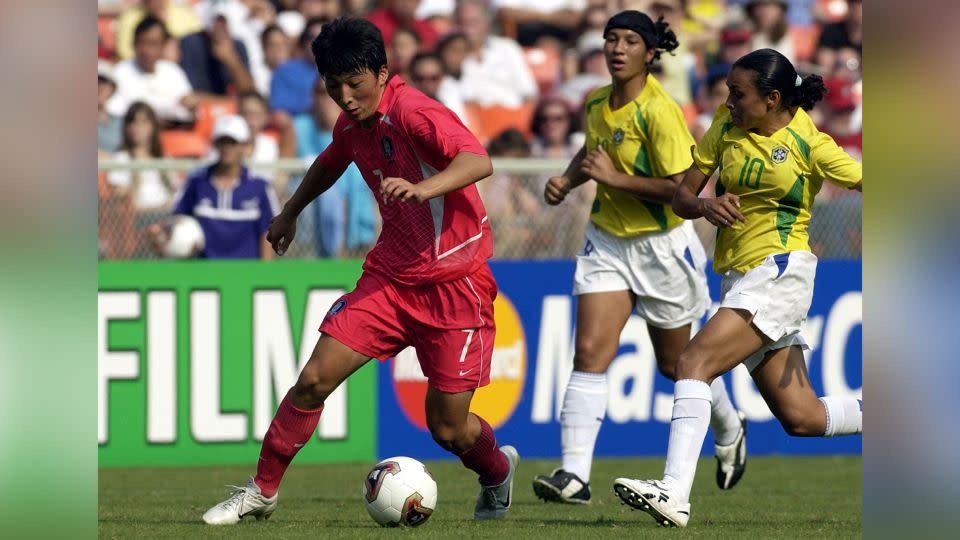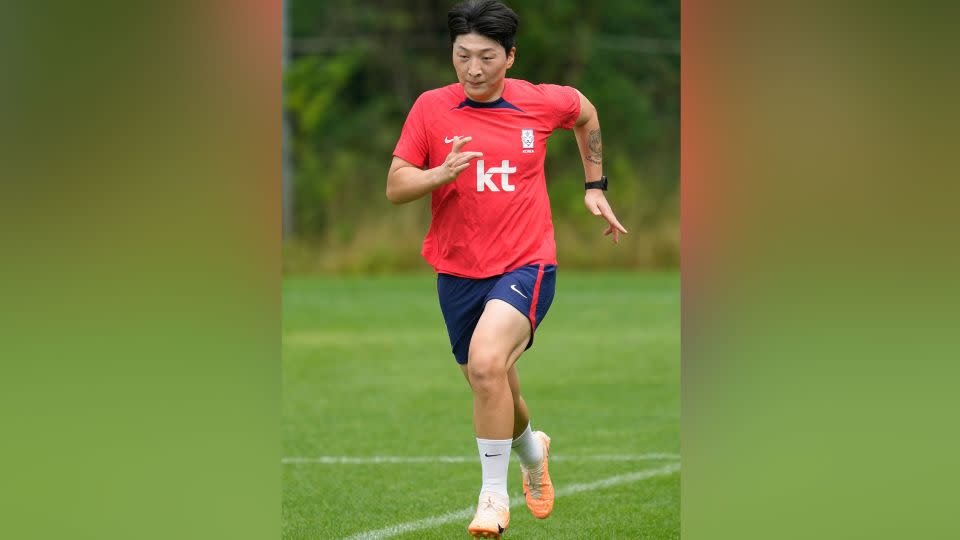South Korea’s Park Eun-seon almost quit soccer after gender controversy. Now she’s going to the 2023 Women’s World Cup
- Oops!Something went wrong.Please try again later.
If South Korean Park Eun-seon’s soccer journey has been a long and winding one, with plenty of ups and down, her inclusion in her country’s 2023 Women’s World Cup squad offers a moment of redemption.
The 36-year-old striker – nicknamed “Park-latan,” a nod to Swedish soccer great Zlatan Ibrahimović – has had a turbulent career; from joining the senior squad for the 2003 Women’s World Cup aged 17 to considering quitting the game altogether due to controversy regarding her gender.
Park has always enjoyed sports, but the thought of playing soccer seriously only arose when her school’s physical education teacher spotted her potential and suggested she give it a go.
“I was already enjoying playing sports, doing Taekwondo and playing soccer with boys in my neighborhood,” Park told CNN Sport.
When she decided to pursue the game more seriously, Park transferred to Changdeok Girls’ Middle School, which had a girl’s soccer team – the team disbanded in 2012, according to the Seoul Football Association.
About three years later, Park became the youngest South Korean woman, at the age of 17, to join the senior squad ahead of the 2003 Women’s World Cup in the US.
“Back then, I think I was more excited about being selected for the national team than feeling any pressure,” Park recalled.

Despite the excitement, the team’s first ever World Cup run ended early as it lost to soccer powerhouses Brazil, France and Norway in the group stage.
But high schooler Park was happy to have lived the special experience.
“When I first went to play in the World Cup, just the fact that I could play with world-class players made me really happy,” she added.
Thoughts of quitting the game
Young and talented, Park’s career was in the ascendancy. She was called again to join the senior team for the 2004 Olympic qualifiers and even the Under-19 squad for various international competitions.
“I enjoyed watching a South Korean women’s player who already, as a middle schooler, had extraordinary speed, extraordinary strength and extraordinary physique,” Jeon Hae-rim – a longtime women’s soccer supporter – told CNN Sport.
According to Jeon, Park has the ability to use her power and height to great effect.
Measuring 182cm (about six feet), Park was the tallest of her teammates at both her club – Seoul City Amazones – and the national team.
In 2013, Park scored a total of 19 goals in the South Korean women’s league – WK League – to become the top scorer of the season.
It helped her team finish second in the table, where it advanced to the playoffs before losing in the final.
Then – when the future seemed ever brighter – everything changed. The coaches of six rival teams questioned the striker’s gender, threatening to boycott the league if she did not undergo gender testing.
Their claims stirred huge controversy in the country and the National Human Rights Commission issued a statement, labeling the act of requiring a gender verification test “sexual harassment.”
The Seoul Sport Council also said the claims were “a serious violation of human rights” and requested the coaches to “take responsible actions” and formally apologize.
At the time, Park took to social media to tell her side of the story.
She wrote in a now deleted Facebook post that she had previously taken gender verification tests to play at the World Cup and the Olympics, which made her “upset and feel ashamed” at a young age.
“It hurts that it’s a similar situation to when many coaches were nice to take me [to their teams] but then changed abruptly,” Park wrote, referring to when she was suspended from playing in three competitions held by the Korea Women’s Football Federation for joining the Seoul City Amazones straight out of high school in 2005, violating the federation’s policy.

The federation formerly required that high school graduates play two years of college soccer before joining semi-professional teams in the WK League, according to local media reports.
The six rival coaches insisted that the comments regarding gender testing were “a joke,” and the controversy eventually fizzled out, but while everyone else involved gradually went about their business, the events left Park scarred.
“It hurt me deeply,” Park told CNN Sport.
“I wasn’t angry, but a bit puzzled. I wondered why I had to go through all that. I frequently thought about even quitting soccer, but felt that doing so would be like admitting the claims.”
Park took some time off the pitch to sort through her emotions, but never gave up on the sport. She transferred to Russian club Rossiyanska in 2014 and then returned to the WK League in 2015.
“To see her continue soccer and overcome the tough times – that came back to me as passion. It really meant a lot,” Jeon said.
“Maybe I was that good?” Park said, adding that she can now laugh about it and move on.
A possible ‘Last Dance’
In 2015, Park was called up to join the national team for that year’s Women’s World Cup in Canada, where the team lost 3-0 to France in the last 16.
That was the last time Park wore the Red Devils’ jersey, until the team’s current head coach, Colin Bell, called her up to the squad about a year before the upcoming Women’s World Cup.
“I played in various competitions and made a lot of trouble along the way, but the current head coach called me to the national team for the first time in seven years, so now I’m preparing well,” Park said as she expressed her gratitude to Bell for giving her an opportunity.
Despite concerns over her age, being the second oldest player after 38-year-old goalkeeper Kim Jung-mi, Park shone on the pitch when she netted goals in two consecutive friendlies against Zambia in April.
Bell said he had asked Park to give the team a good 15 to 20 minutes per match when he called her to the national team last year.
“Since then, she has shown herself working hard and getting strong,” said Bell after the two friendlies, according to the Korea Football Federation.
“Personally, I want to keep her like a flower in a greenhouse until the World Cup,” Bell said in April, hinting at a possible World Cup call-up for the 36-year-old striker this summer that has now been confirmed.
As she awaited South Korea’s final squad announcement, Park added: “I honestly don’t think it’s easy to play in the World Cup three times as a member of the national team, so personally it’d be very meaningful.
“It’s an opportunity that will never come again, so I want to get a goal that I can brag about later. ‘I scored a goal in the World Cup!’ I want this to be an opportunity where I can make this come true,” she said of her World Cup hopes.
South Korea is due to face Columbia in its first Group H match at the 2023 Women’s World Cup on July 25 and “Park-latan’s” dream may well come true on the biggest stage of them all.
Park will also be joined by South Korean teammate Casey Phair in Australia and New Zealand. The 16-year-old was born in the US and, according to Reuters, is the first player of mixed heritage to be selected for a Korean World Cup squad.
For more CNN news and newsletters create an account at CNN.com

